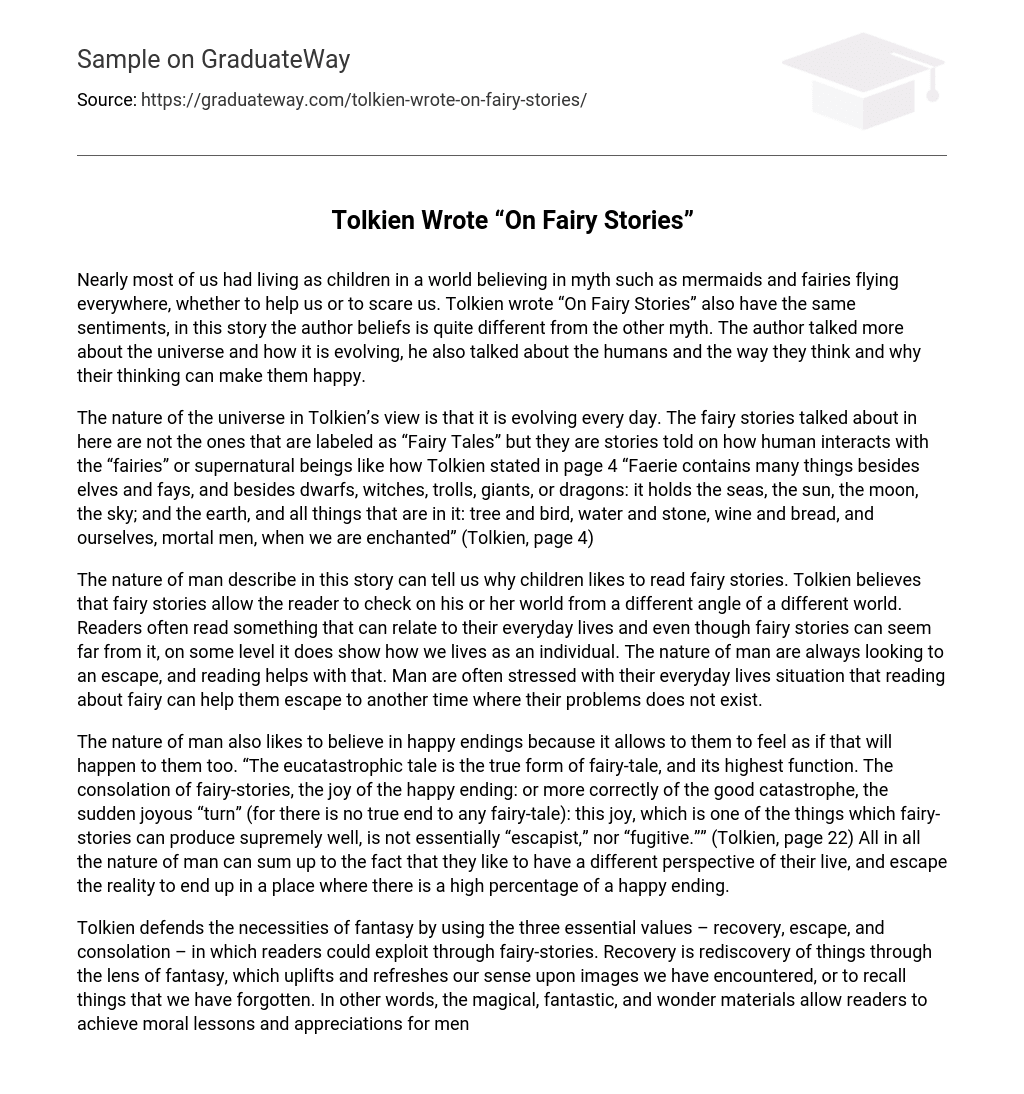Nearly most of us had living as children in a world believing in myth such as mermaids and fairies flying everywhere, whether to help us or to scare us. Tolkien wrote “On Fairy Stories” also have the same sentiments, in this story the author beliefs is quite different from the other myth. The author talked more about the universe and how it is evolving, he also talked about the humans and the way they think and why their thinking can make them happy.
The nature of the universe in Tolkien’s view is that it is evolving every day. The fairy stories talked about in here are not the ones that are labeled as “Fairy Tales” but they are stories told on how human interacts with the “fairies” or supernatural beings like how Tolkien stated in page 4 “Faerie contains many things besides elves and fays, and besides dwarfs, witches, trolls, giants, or dragons: it holds the seas, the sun, the moon, the sky; and the earth, and all things that are in it: tree and bird, water and stone, wine and bread, and ourselves, mortal men, when we are enchanted” (Tolkien, page 4)
The nature of man describe in this story can tell us why children likes to read fairy stories. Tolkien believes that fairy stories allow the reader to check on his or her world from a different angle of a different world. Readers often read something that can relate to their everyday lives and even though fairy stories can seem far from it, on some level it does show how we lives as an individual. The nature of man are always looking to an escape, and reading helps with that. Man are often stressed with their everyday lives situation that reading about fairy can help them escape to another time where their problems does not exist.
The nature of man also likes to believe in happy endings because it allows to them to feel as if that will happen to them too. “The eucatastrophic tale is the true form of fairy-tale, and its highest function. The consolation of fairy-stories, the joy of the happy ending: or more correctly of the good catastrophe, the sudden joyous “turn” (for there is no true end to any fairy-tale): this joy, which is one of the things which fairy-stories can produce supremely well, is not essentially “escapist,” nor “fugitive.”” (Tolkien, page 22) All in all the nature of man can sum up to the fact that they like to have a different perspective of their live, and escape the reality to end up in a place where there is a high percentage of a happy ending.
Tolkien defends the necessities of fantasy by using the three essential values – recovery, escape, and consolation – in which readers could exploit through fairy-stories. Recovery is rediscovery of things through the lens of fantasy, which uplifts and refreshes our sense upon images we have encountered, or to recall things that we have forgotten. In other words, the magical, fantastic, and wonder materials allow readers to achieve moral lessons and appreciations for men after they have come across the unfamiliar context from their internally consistent world.
Tokien considers fairy-stories as a form of “escapist” literature in which readers find their own liberation and freedom without feeling ashamed or being scorned. “Why should a man be scorned if, finding himself in prison, he tries to get out and go home? Or if, when he cannot do so, he thinks and talks about other topics than jailers and prison walls?” (Tokien, 21). Consolation is considered a highly necessary part to construct a fairy-story. It refers to a moment of joy where the existence of tragedy and the evil are both defeated.
Consolation successfully escapes from the ancient limitations in which the creation of a happy ending or Eucatastrophe ultimately satisfies the readers’ desires and ambitions. For Tolkien, death is the ultimate escape and eternal life is the ultimate consolation, which intermingle to create the Great Escape. Tolkien amplifies the significance of fantasy and its beneficial values in order to emphasize their psychological functions and undeniable impacts on those who successfully inherit a Secondary World in particular and other readers in general.
Man can be happy when they feel as if they have achieved something like a happy ending, the ones in fairy stories. As Tolkien stated “This” joy” which I have selected as the mark of the true fairy-story (or romance), or as the seal upon it, merits more consideration” and “The peculiar quality of the ”joy” in successful Fantasy can thus be explained as a sudden glimpse of the underlying reality or truth. It is not only a “consolation” for the sorrow of this world, but a satisfaction….” (Tolkien, page 23) Reader wants to feel the “joy” when reading these stories because it makes them feel as if those joys are guaranteed to them in their lives.





